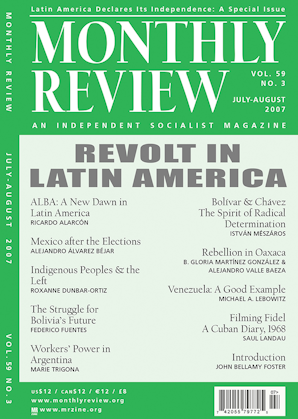Also in this issue
- Mexico after the Elections: The Crisis of Legitimacy and the Exhaustion of Predatory Neoliberalism
- Indigenous Peoples and the Left in Latin America
- The Latin American Revolt: An Introduction
- The Struggle for Bolivia's Future
- Oaxaca: Rebellion against Marginalization, Extreme Poverty, and Abuse of Power
- Filming Fidel: A Cuban Diary, 1968
- Venezuela: A Good Example of the Bad Left of Latin America
- Bolívar and Chávez: The Spirit of Radical Determination
- Workers' Power in Argentina: Reinventing Working Culture

